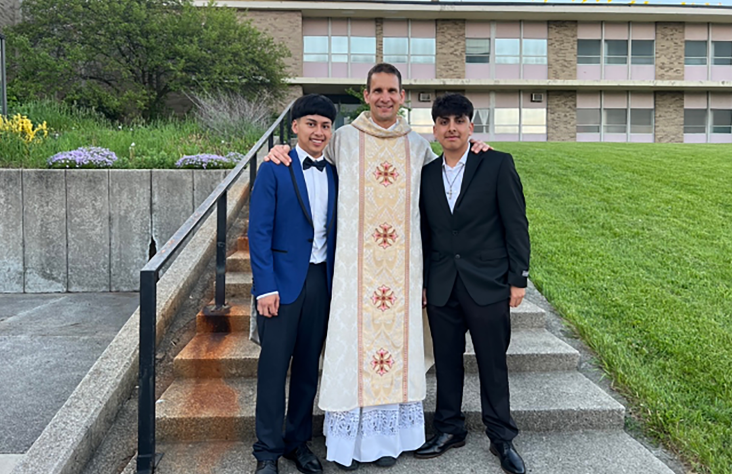February 5, 2013 // Uncategorized
Initiative invites Catholics to Reconciliation
By Tim Johnson
Pope Benedict XVI has said “the New Evangelization begins in the confessional.” With the Lenten penitential season approaching, Bishop Kevin C. Rhoades has designated Wednesday, March 6, from 6-8 p.m., “as the date and time for all the churches of our diocese to be open for prayer and am asking all our priests to hear individual confessions during that two-hour time period,” he wrote in a letter to priests.
The campaign is called “The Light Is On For You,” and is endorsed by the U.S. bishops.
“The Light Is On For You is an invitation to all Catholics of a diocese to stop in church for prayer and the opportunity for Confession,” Bishop Rhoades said. The program began in the Archdiocese of Washington and has been adopted by other dioceses with much success. With this program, all parishes in a diocese open their churches on a particular evening for Confessions.
The U.S. Bishops have issued a pastoral exhortation — see page 2 — encouraging the faithful to avail themselves to the sacrament of Penance during Lent of 2013.
The March 6 date will be a “concerted diocesan effort to highlight the sacrament of Penance,” Bishop Rhoades said. “It is not meant to replace Penance services or other regularly scheduled Confession times.”
Confession times from the parishes across the diocese can be found in a guide here on pages 8-9. Some parishes were still in the process of determining times for Lenten Penance services and other Confessional offerings. Today’s Catholic encourages penitents to also check parish bulletins and parish websites for updates.
Materials for The Light Is On For You include a short guide to Reconciliation. This includes some of the following information.
What is Reconciliation?
Reconciliation (also known as Confession or Penance) is a sacrament instituted by Jesus Christ in His love and mercy to offer sinners forgiveness for offenses committed against God. At the same time, sinners reconcile with the Church, because it is also wounded by our sins.
Every time we sin, we hurt ourselves, other people and God. In Reconciliation, we acknowledge our sins before God and His Church. We express our sorrow in a meaningful way, receive the forgiveness of Christ and His Church, make reparation for what we have done, and resolve to do better in the future.
The forgiveness of sins involves four parts:
• Contrition: a sincere sorrow for having offended God, and the most important act of the penitent. There can be no forgiveness of sin if we do not have sorrow and a firm resolve not to repeat our sin.
• Confession: confronting our sins in a profound way to God by speaking about them — aloud — to the priest.
• Penance: an important part of our healing is the “penance” the priest imposes in reparation for our sins.
• Absolution: the priest speaks the words by which “God, the Father of Mercies” reconciles a sinner to Himself through the merits of the Cross.
A guide to make a good Confession is located on page 20 of this week’s issue of Today’s Catholic.
The Light Is On For You materials provide the following examination of conscience.
Examination of conscience
Recall your sins. Prayerfully ask yourself what you have done with full knowledge and full consent against God’s and the Church’s commandments.
Do I pray to God every day? Have I thanked God for His gifts to me?
Did I put my faith in danger through readings contrary to Catholic teachings or involvement in non-Catholic sects? Did I engage in superstitious practices: palm reading or fortune-telling?
Did I take the name of God in vain? Did I curse or take a false oath?
Did I miss Mass on Sundays or holy days of obligation through my own fault? Am I attentive at Mass? Did I keep fast and abstinence on the prescribed days?
Did I disobey my parents and lawful superiors in important matters?
Did I hate or quarrel with anyone, or desire revenge? Did I refuse to forgive? Was I disrespectful?
Did I get drunk? Did I take illicit drugs?
Did I consent to, recommend, advise, or actively take part in an abortion?
Did I willfully look at pornography, entertain impure thoughts, or engage in impure conversations or actions? Did I use artificial means to prevent conception?
Was I unfaithful to my spouse? Did I engage in sexual activity outside of marriage?
Did I steal or damage another’s property? Have I been honest and just in my business relations?
Have I been responsive to the needs of the poor and respected the dignity of others?
Did I tell lies? Did I sin by calumny, or detraction, of others? Did I judge others rashly in serious matters?
Have I envied other people?
The best news. Delivered to your inbox.
Subscribe to our mailing list today.





